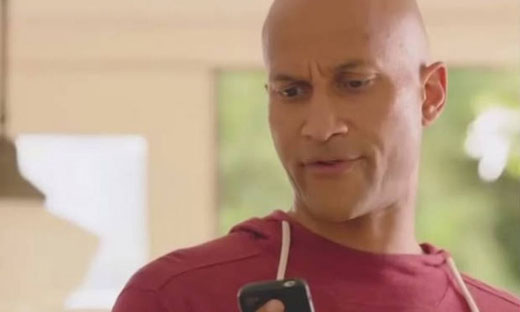Make-Believe
Kendall Walton argues that those like Meinong and Kripke who think fictional entities are real because of the way we talk about them are missing something fundamental. When we talk about fictions, we are often pretending they are real. And if we take this practice of make-believing seriously, Walton argues, we don't have to resort to saying that fictional entities exist.
We often pretend that things are not as they are. Sometimes we intend to do so with the intention of deceiving others or ourselves. We pretend we like someone when we don't; we pretend we're happy with how our life is going when we are not. But often we pretend with no intention to deceive. When playing with a child, we might say a couch is a train, a doll is a baby, a human is a bear. If a pillow is thrown off the couch, we may say the train is broken, or that a passenger has fallen off.

We adults can pretend a piece of plastic is supertechnology, but we struggle with pretending a stick looks like a piece of plastic.
Walton argues that many of our statements about fictions, including the ones I've been discussing, are not serious claims about pretend worlds. Instead, they are statements in which we are pretending that the world of the fiction is real. When we say 'Sherlock Holmes lives at 221B', we aren't talking about an abstract object or some strange thing that subsists but does not exist. We are pretending that we live in the world of Arthur Conan Doyle's books, and saying from the perspective of that pretense that Sherlock lives where he does.
If we are making a straightforward claim about a work of fiction, the fiction (in whatever form it takes) serves as a prop which licenses an official game of make-believe. If we are doing something more unruly, like writing fan fiction, we are playing an unofficial game. While the rules of unofficial games are usually not as clearly defined as those of official games, in both cases, there are clear cases of statements that conform to the rules and those that don't. Our pretend statements about fiction are true when they conform to the rules of the game we are playing when we pretend. For example, 'Sherlock lives at 221B' comes out true because the Conan Doyle stories authorize playing in that way.
One advantage of the make-believe theory is that we don't have to say that Sherlock is a thing. We have to think that the Conan Doyle stories exist (it actually turns to be tricky to say what, exactly, a story is, but we'll ignore that for now). The stories define the rules of the game, and the rules of the Sherlock game say that when 'Sherlock lives at 221B' is said, it is true. We never have to say that there is something, Sherlock, who has an address, 221B.
Another advantage about the make-believe theory is that it explains why we vacillate between thinking statements about fictional characters can be true and false. We can shift very quickly between playing and not playing, and we can shift between different games as well. (Children are especially good at this!) When we say 'Sherlock lives at 221B....but of course actually he doesn't exist', we are pretending and then ending our pretense in the same sentence.
One more cool thing about the make-believe theory. Walton observes that often we communicate the appropriateness of behavior simply by engaging in it ourselves. When we say 'Hamlet never saw a real ghost', we are signaling the appropriateness of the Hamlet game, and asking others to play it with us. This phenomenon is rampant in the play of children, where the rules of games are constantly negotiated and changed. By saying 'Oh no, a passenger has fallen off, stop the train!', we are signaling a new game where cushions are passengers. Our ability to communicate with very little information that we are playing a game, and which game we are playing, is quite remarkable.

It took 450 years for the scientific revolution to undermine this ability (NSFW).
Walton claims statements about fictions can be true or false, but this isn't a requirement of make-believe theory. If statements about fiction are examples of pretending, why not say that we are even pretending to make a statement? There are some who think that statements about fictions are not subject to being true or false. They may be appropriate or inappropriate to the rules of the fictional game that is being played, and this explains why we like the 221B statement better than the 221C statement. An analogy here is to expressions of pain. "Ouch!" can't be true or false, and it doesn't make an assertion, but it can be apt or misleading.
Copyright 2019 by Sam Ruhmkorff
